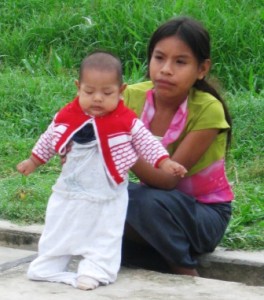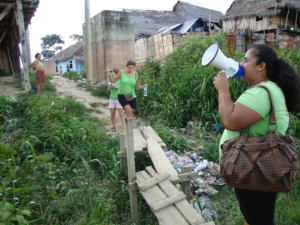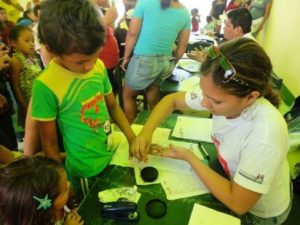Problem Sketch:
More than a quarter of the children in and around Iquitos either do not go to primary school or leave prematurely. The illiteracy rate is very high. The main reason these children do not attend school is the lack of ID papers. Without these documents, children cannot attend school. Parents from poor neighborhoods usually cannot afford the registration cost and the family situation is often so complicated that they do not know where to look for the papers. As a result, they are given the runaround by the RENIEC officials (official local registration office). Unaware of the rights of their children and/or the consequences of life without proper ID papers, these parents ultimately give up trying.
Other reasons these child ren do not go to school are poverty and lack of education of the parents themselves. Due to lack of money and because parents do not always understand the importance of education, far too many children are used at home as babysitters for younger siblings or are sent to earn extra money for the family. It is a vicious cycle for these families.
ren do not go to school are poverty and lack of education of the parents themselves. Due to lack of money and because parents do not always understand the importance of education, far too many children are used at home as babysitters for younger siblings or are sent to earn extra money for the family. It is a vicious cycle for these families.
Objective of El Manguaré:
Help as many disadvantaged children as possible obtain birth certificates and proper identification papers, increase the accessibility of mainstream schools for these children, and streamline their entrance to school, in collaboration with the RENIEC(official local registration office), parents, and schools.
Background and plan of action:
 With the help of volunteers, Nuria, a social worker for El Manguaré, combs the neglected areas in search of families with undocumented children and/or children who do not attend school.
With the help of volunteers, Nuria, a social worker for El Manguaré, combs the neglected areas in search of families with undocumented children and/or children who do not attend school.
The registration of the birth of a baby is free until the baby is 2 months old. Thereafter, the process is complicated and often financially out of reach for a large portion of the population of Iquitos. In addition, the family situations are often so complicated that registration is practically impossible. Officially, signatures and copies of birth certificates of both parents are necessary to register a child.
We meet many single mothers with children from multiple fathers. Often the fathers do not recognize these children to avoid paying child support or alimony and disappear completely from the lives of their children. It is also not uncommon that children are raised by grandparents, aunts, other relatives, or friends; when the mother disappears with another man. The new man feels that the children from her previous relationships are not his responsibility and often within this (again not lengthy) relationship more new children will be born.
Many mothers who come from the jungle come uneducated, and totally unprepared for things such as official registration and the consequences of failing to register their children. The mother herself will likely have no birth certificate, making it impossible to register her children.
After combing a neighborhood we often find shy and anxious mothers, and sometimes even fathers, who slowly come out of their houses. After we have won their trust we inform them patiently and at length about the importance of documentation for their children. We invite them to campaigns where we can help them,in collaboration with the local registration services.
 The collaboration with the registrar had a somewhat rocky start. Several times we had to point out to them the human right to identity.. Now, however, the registration campaigns run smoothly and the government officials assist with the process. However, it now runs smoothyly and they set themselves to be helpful and flexible during our campaigns.They tend to be lenient with helping these people get an identity (the majority of cases have the wrong or out of date documents required for registration). The red-tape is reduced to a minimum and the cost is next to nothing for the children who seek identify documentation via El Manguaré.
The collaboration with the registrar had a somewhat rocky start. Several times we had to point out to them the human right to identity.. Now, however, the registration campaigns run smoothly and the government officials assist with the process. However, it now runs smoothyly and they set themselves to be helpful and flexible during our campaigns.They tend to be lenient with helping these people get an identity (the majority of cases have the wrong or out of date documents required for registration). The red-tape is reduced to a minimum and the cost is next to nothing for the children who seek identify documentation via El Manguaré.
Each year we help about 2,000 children and their parents obtain the birth documents and identity papers needed to be admitted at school (or receive healthcare). During the “combing” and campaigns, we also look for children who are not attending school. This is often resolved by obtaining identity papers but sometimes the situation is more complicated or the family has no funds to put the child in school. We also encounter situations where the child must stay at home to help care for siblings or put food on the table. We talk to these families, pointing to the enormous importance of education for their children in the big city and help where we can to get the child into, or back to, school.



